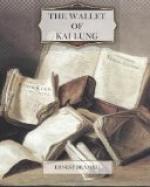In his ignorance of military matters it had not entered the mind of Ling that his authority did not give him the power to commence an attack without consulting other and more distinguished persons. At the suggestion, which he accepted as being composed of truth, he paused, the enlightened zeal with which he had been inspired dying out as he plainly understood the difficulties by which he was enclosed. There seemed a single expedient path for him in the matter; so, directing a person of exceptional trustworthiness to prepare himself for a journey, he inscribed a communication to the Mandarin Li Keen, in which he narrated the facts and asked for speedy directions, and then despatched it with great urgency to Si-chow.
VI
When these matters were arranged, Ling returned to his tent, a victim to feelings of a deep and confused doubt, for all courses seemed to be surrounded by extreme danger, with the strong possibility of final disaster. While he was considering these things attentively, the spy who had brought word of the presence of the enemy again sought him. As he entered, Ling perceived that his face was the colour of a bleached linen garment, while there came with him the odour of sickness.
“There are certain matters which this person has not made known,” he said, having first expressed a request that he might not be compelled to stand while he conversed. “The bowmen are as an inferior kind of jackal, and they who lead them are pigs, but this person has observed that the Heaven-sent Commander has internal organs like steel hardened in a white fire and polished by running water. For this reason he will narrate to him the things he has seen—things at which the lesser ones would undoubtedly perish in terror without offering to strike a blow.”
“Speak,” said Ling, “without fear and without concealment.”
“In numbers the rebels are as three to one with the bowmen, and are, in addition, armed with matchlocks and other weapons; this much I have already told,” said the spy. “Yesterday they entered the village of Ki without resistance, as the dwellers there were all peaceable persons, who gain a living from the fields, and who neither understood nor troubled about the matters between the rebels and the army. Relying on the promises made by the rebel chiefs, the villagers even welcomed them, as they had been assured that they came as buyers of their corn and rice. To-day not a house stands in the street of Ki, not a person lives. The men they slew quickly, or held for torture, as they desired at the moment; the boys they hung from the trees as marks for their arrows. Of the women and children this person, who has since been subject to several attacks of fainting and vomiting, desires not to speak. The wells of Ki are filled with the bodies of such as had the good fortune to be warned in time to slay themselves. The cattle drag themselves from place to place on their forefeet; the fish in the Heng-Kiang are dying, for they cannot live on water thickened into blood. All these things this person has seen.”




